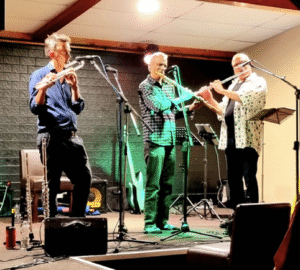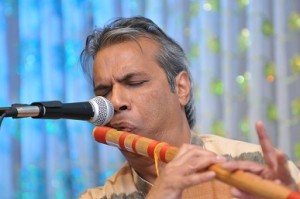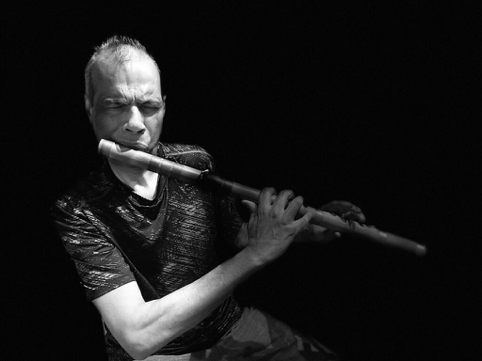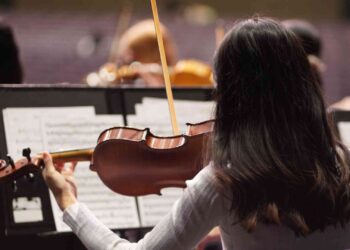One of the earliest highlights of my auditory education was a 1966 album called Indo-Jazz Suite, an extraordinary, ground-breaking collaboration between UK-Jamaican saxophonist Joe Harriott and Anglo-Indian John Mayer, a highly-educated and classically trained violinist and composer. Listening to this album now, in the light of many years of familiarisation with the general sound of Indian music (tanpura drone, sitar, tabla) and Indian scales combined with American and European instruments (endless, but think John Coltrane, Alice Coltrane, Josef Lateef, Ravi Shankar, Ornette Coleman, or if you don’t listen to much jazz think George Harrison Within You, Without You) the combination of modern and ancient no longer sounds strange, but has come to be known as Indo-Jazz Fusions.The absolutely modern feel of this concept album, though, is still very striking.
The word ‘fusion’ has one meaning, but infinite associations and connotations. The physical meaning of it, joining together, is clear, hence the fusion of two compounds or colours or metals, or teas or atmospheres. It isn’t unusual to talk of the fusion of minds, or even the fusion of souls (though personally I have trouble finding out where my soul actually is). But we also talk of the fusion of sounds: the fusion of soprano and tenor voices among a symphonic accompaniment, or the fusion of a solo concerto piano with an orchestra.

Gareth Lockrane, Deepak Ram, Rowland Sutherland
Deepak Ram studied Indian classical music for many years, under one of the greatest exponents of the bansuri flute. Seeing him sitting cross-legged on the stage in St. Leonards with exceptional tabla player Sanjay Jhalla and a recorded loop of a tanpura drone, with an audience of 70 or 80 including several family members – I chatted with his uncle and his daughter buying ice creams during the interval – it was hard to believe that Ram is an acknowledged master of this simple-looking bamboo instrument. Since the 1990s he has toured, recorded, and collaborated with some of the best musicians in both western and eastern hemispheres.

Deepak Ram
He is genial and unassuming and, as a true educator, has a gift for clarifying what he is about to play in terms that his audience can understand. Thus, for instance, he explains the ragas they play are based on a seven-beat sequence, or a nine-beat rhythm Taa Taa Taa ,Taa Taa Taa, ta-ka-ta ta-ka-ta ta-ka-ta. Or the last but one piece, a pentatonic scale, just five notes, he explains, and plays them. Then through the raga he and Sanjay Jhalla demonstrate exactly what can be achieved by exploring and developing complex melodics within and around those five notes.
One of the more striking aspects of this elegant concert was another kind of fusion, that of the interchange of musical ideas between Ram and Jhalla. They don’t call the tabla ‘talking drums’ for nothing. Jhalla waited while Ram began his eloquent flute improvisation, shaking his head until he felt able to join him. Soon after he joined in the interchange started to happen between the sound of the tuned drums and the sound of the flute, conjuring up ancient worlds, embellished by modern technology, in a fusion of time-frames.
A strong feature of this kind of music is the interplay, the connection between the musicians, the fusion of ideas that make up the structure, length, and direction of the raga. For Indian classical performers though, P. K. Rejimon has written: “the music has a philosophical and religious connection and is deeply embedded in the whole structure of Indian culture.” A fusion, then, a fusion of cultures, a fusion of philosophies, of worlds, of time-frames.
Ram’s second performance, over four days in Hastings, was at Jazz Hastings at the EHSAA on the following Tuesday, another evening of fine musicians put together by Reggie Hendrickse. Deepak Ram (who is from South Africa), Rowland Sutherland (a South African classical flautist), Gareth Lockrane (bass flute, alto flute, concert flute, piccolo), Terry Pack on electric bass, and Andy Williams, a very talented guitarist hiding his light under a bushel in the corner, but with a guitar technique that sounds a little like that of John McLaughlin in Shakti.
So this was another fusion, of different traditions. After the first number (Coltrane’s Naima with the same recorded tanpura) Ram introduced the band and explained – almost diffidently – that he was not a jazz musician, just a classical flute musician who liked to play jazz. The fact is he spent twenty-five years as a classical flautist and now returns to encompass the jazz he grew up listening to. The first two numbers were necessarily tentative – they hadn’t played together before that evening – but by the third or fourth number the combo had, one could say, fused. They had fused Indian classical, African classical and Western classical, American and British jazz, and jazz-rock.
In the second half Rowland Sutherland faultlessly played two beautiful solo pieces by Nigerian composers: Ilulu by Joshua Uzoigwe and the wonderful Visions II by Bongani Ndoda-Breen: these pieces were new to me and are not as well-known as they deserve to be. The latter piece, incidentally, is also based on a pentatonic scale (a different one), and thus formed another link with the Indian tradition, another fusion.
The penultimate number was Miles Davis’ All Blues; a version which should probably have been called All Flutes, and it was so good, so innovative, and so joyous that it brought tears to my eyes. “I was brought up on Miles Davis and John Coltrane,” Ram told me. He also told me that a musicologist had written a very learned article explaining in great detail why it was impossible to meld the sound of the Indian bansuri flute with the sound of Western instruments. He is striving to prove that musicologist wrong. And he is succeeding.










